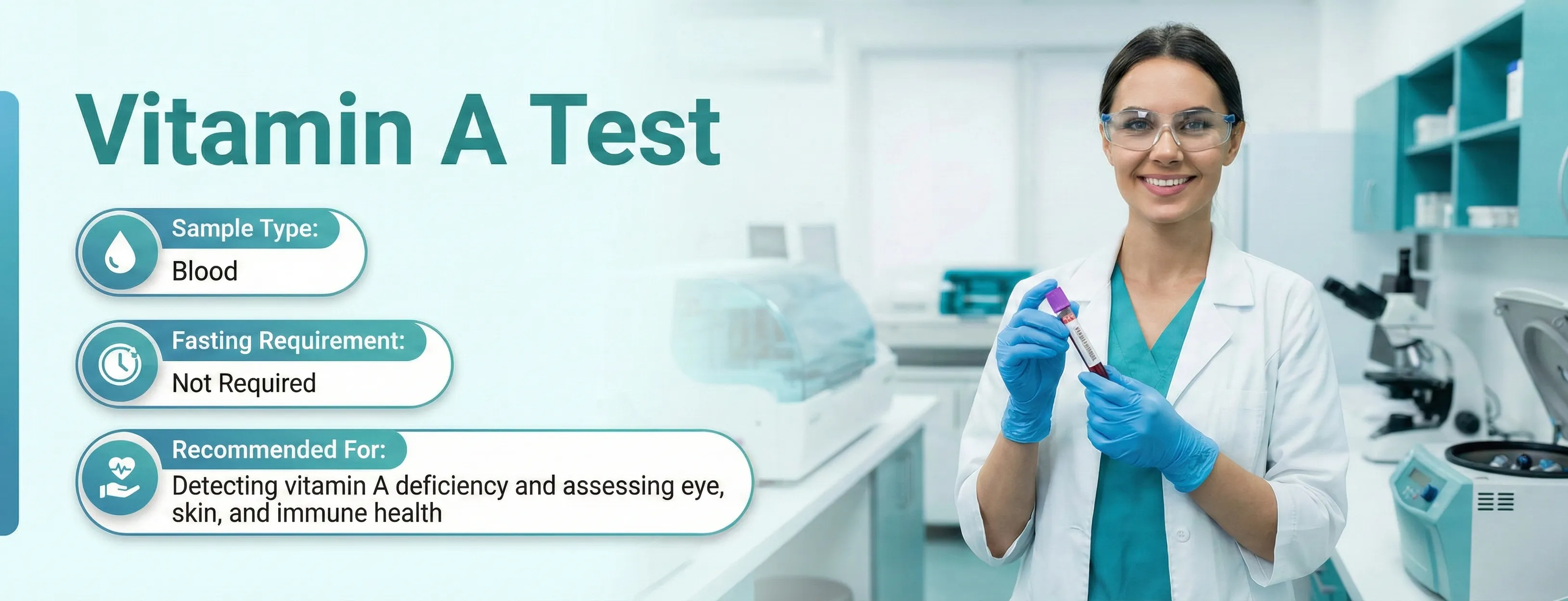17+ orders placed in your location
100% NABL & ISO Certified Lab • 100% Accurate Reports
Vitamin A Test
Retinol Test, Vit A test
- SummaryThe Vitamin A Test measures the level of vitamin A (retinol) in the blood, which is essential for healthy vision, immune function, skin health, and cell growth. It helps detect vitamin A deficiency or toxicity, especially in individuals with nutritional concerns or absorption issues. The test requires a blood sample, does not require fasting, and is suitable for all age groups and genders.Read more
- Reports Within26 HrsView Sample Report100% NABL & ISO Certified Labs
- SampleBlood
- AgeAll Age Group
- GenderMale and Female
- FastingNot Required
PharmEasy Promises
Know More About The Test
A quick info on Vitamin A Test
Overview
Retinol, Retinyl Esters, and Retinals are among the fat-soluble retinoids (chemical compounds) known as Vitamin A. Vitamin A plays a vital role in immune function, reproduction, eyesight, and cellular communication.
Vitamin A is further essential for vision because it is a component of Rhodopsin, a protein that absorbs light in the retinal receptors. It helps in night vision as Vitamin A is used as a part of Rhodopsin that helps to see under low light.
Vitamin A is also essential for the creation and maintenance of the lungs, heart, kidneys, and other organs, as it promotes cell growth and cell differentiation.
Two accessible forms of vitamin A available in the human diet are
- Preformed Vitamin A (Retinol & its esterified form, Retinyl Ester) - Animal-based foods, including dairy products, fish, and meat, contain the preformed vitamin A.
- Provitamin A Carotenoids - Beta-carotene is the most significant provitamin A carotenoid. Alpha-carotene and beta-cryptoxanthin are the other provitamins A carotenoids. These plant pigments are converted into vitamin A by the body.
The Provitamin A and Preformed Vitamin A must be transformed intracellularly into two active forms for maintaining the vitamin’s critical biological actions. The two dynamic forms are Retinal and Retinoic acid.
Vitamin A tests check if individuals have too much or too little vitamin A in their blood.
Vitamin A insufficiency is a risk factor for severe measles; vitamin A therapy can minimise the duration of the illness or disease and the severity of symptoms, and the chance of mortality.
Vitamin A deficiency can impair night vision, induce eye damage, and even result in blindness in severe cases. On the other hand, too much vitamin A can be harmful, resulting in various symptoms like headaches, rashes, coarse hair, dry skin, cracked lips, and in rare cases, birth abnormalities.
Overuse of vitamin supplements is the leading cause of vitamin A toxicity. It can, however, happen when the diet contains a significant amount of vitamin A-rich foods, such as beef liver, cod liver oil, carrots, etc.
If a body has difficulties absorbing fats via the digestive tract, it may be deficient in vitamin A. So, a Vitamin A test is preferred. The test may also be advised if an individual has:
- Cystic fibrosis, a chronic lung disease.
- Problems with the pancreas like inflammation (pancreatitis) and swelling or the organ’s inability to produce adequate enzymes (pancreatic insufficiency).
- Coeliac disease, a minor intestinal ailment
Vegans, children under the age of five, and alcoholics may require more Vitamin A. If an individual has specific disorders like cystic fibrosis, Crohn’s disease or liver disease, they may need more vitamin A. Consult the doctor to determine whether you need any vitamin A supplements.
Risk Assessment
Vitamin A toxicity, Vitamin A deficiency
What does this test detect?
The Vitamin A test measures the levels of vitamin A in the blood.
Indications for Vitamin A Test
The Vitamin A test is indicated in people with the following symptoms of vitamin A deficiency -
- Inflamed or dried eyes
- Teeth or bone problems in young children
- Skin rashes
- Dry skin
- Recurring infections
- Night blindness
- Reduced growth
The Vitamin A test is indicated in people with the following symptoms of vitamin A toxicity -
- Loss of appetite
- Anaemia
- Increased pressure in the brain (pseudotumor cerebri)
- Liver and spleen enlargement
- Hair loss
- Diarrhoea
- Lack of muscle coordination (ataxia)
- Bone & muscle pain
- Double vision
- Nausea
A Vitamin A test may be prescribed regularly when an individual has an illness linked to nutritional malabsorption, such as-
- Diabetes
- Irritable bowel syndrome
- Coeliac disease
- Crohn’s disease, an inflammatory bowel disease type
How frequently should you take this test?
- The Vitamin A test is repeated every 3-6 months in case of a deficiency or toxicity. This is to monitor the treatment for your deficiency or toxicity.
- As a part of your routine tests, the Vitamin A test can be repeated annually.
Test Preparation
Before the Test
It is essential to refrain from eating or drinking for a duration of A to B hours before the Vitamin A test. This fasting is vital for ensuring the accuracy of the results. Consequently, it is advisable to consult with a healthcare professional prior to any test to ascertain if there are any particular guidelines to be followed.
During the Test
A blood sample will be drawn from a vein in your arm. The procedure includes:
- Cleansing the area where the needle will be inserted with an antiseptic solution.
- Applying a tourniquet around your arm to enhance the visibility of the veins.
- Inserting a sterile needle into the vein to draw the blood, which may result in slight discomfort and will take only a few seconds.
- Transferring the collected sample into a small container or test tube labelled with your test details.
After the Test
Once the blood sample is collected:
- A bandage will be placed over the site of the needle insertion to minimise any bleeding.
- It is common to experience mild soreness or lightheadedness, which should not be a cause for alarm. You may be instructed to rest for a brief period.
- Should you notice any bleeding, discomfort, or rashes at the site of the puncture, please reach out to your healthcare provider.
Parameters
The Vitamin A test includes only one parameter, the levels of vitamin A in the blood.
Ranges
The ranges for the Vitamin A test are as follows. The ranges will vary during pregnancy and lactation.
Ranges | Level | Remarks |
Below 10.0 mcg/dL | Severe Deficiency | Deficient levels of Vitamin A |
Below 15.00 mcg/dL | Deficiency | Moderately low levels of Vitamin A |
15 to 60 mcg/dL | Normal | Adequate Levels of Vitamin A |
Above 60.0 mcg/dL | Hypervitaminosis | High levels of Vitamin A |
The normal values and reference ranges of the test may vary from lab to lab. Please refer to the ranges mentioned in the report and consult a doctor to understand the interpretation of lab reports.
Test Result Interpretation
A low vitamin A blood test result indicates that an individual is deficient in vitamin A. Deficiency of vitamin A can lead to night blindness, skin rashes, dry skin, reduced growth in children, and recurrent infections.
A normal vitamin A blood level suggests an individual has adequate vitamin A right now, but it doesn’t tell you how much vitamin A they have in reserve. Until vitamin A reserves are depleted, the body will keep vitamin A levels in the blood at a reasonably constant level.
A high vitamin A blood level indicates that too much vitamin A is circulating in the blood, leading to toxicity if it is deposited in other body regions. Excess of vitamin A can lead to dizziness, nausea, headaches, anaemia, diarrhoea, loss of appetite, and double vision. This usually occurs due to increased intake of vitamin A-rich foods and vitamin A supplements.
Too much vitamin A in pregnant women can lead to birth abnormalities in their children.
Risks and Limitations
The Vitamin A test is a standard blood test that is generally safe and does not commonly result in complications. However, kindly contact your physician immediately if you encounter:
- Persistent bleeding from the needle insertion site.
- Pain or swelling at the site of blood collection.
Limitations of the test
- Possibility of errors caused by equipment or human factors.
- Risk of misinterpretation of the test markers.
Was This Test Information Helpful?
Please rate your experience
References
Health packages containing 'Vitamin A Test'
People Also Ask
Is there a blood test for Vitamin A?
Is vitamin A a fasting blood test?
What is the normal range of vitamin A?
Is vitamin A harmful?
What are the types of vitamin A?
Have any doubts? Ask us.
Ask us anything about the Vitamin A Test to understand it better
We provide trusted, expert-curated health content to support better awareness,prevention, and care.
Backed by experienced doctors, medical experts, and strict editorial standards.


